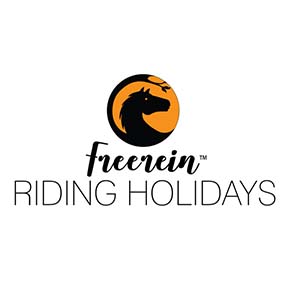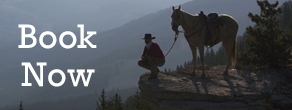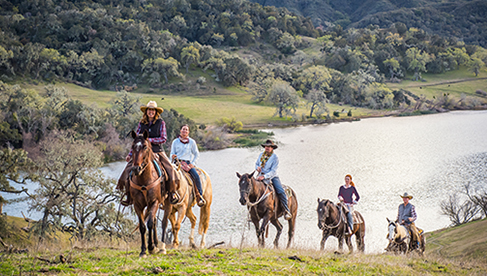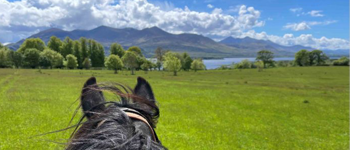Horse Riding in Devon, England — Life Lessons at West Steart Farm
Meg Robbins rides at Devon, learns about groundwork and takes the lesson home
by Meg Robbins
I’m trying to be of assistance to Zana Jackson, who owns West Steart Farm and Devon Riding Holidays with her husband Jim. The first day of my short break holiday was a lesson followed by a post-jet lag Sunday ramble to the pub on horseback. Day two was full and thrilling as we spent it cavorting about on the farm’s capable Dales ponies. We rode high up to the moors exploring new trails, and now we are doing evening chores.
 >
>We had fed yearlings, put broodmares in their nighttime shelter, escorted the herd of magnificent Dales ponies to their grazing and coaxed enchanting infant lambs to their mothers’ milk. We are now leading Jim’s prized young bloodstock to their stalls, and I have the easy one. He allows me to lead him through the early spring darkness at a courteous pace just behind my right shoulder. When I bring him into his stall, he knows to turn and face the door as I disengage him from his head collar and gently toss a blanket over his back. The March night is chilly, and these are thin-skinned, champion-bred Thoroughbreds. My charge is well-behaved, mindful and a clear example of Zana’s attention to the science of groundwork.
Groundwork for Horses — My Challenges with Archie
Groundwork with horse training is big. Just do a Google search on it and you’ll be inundated with some “free” chat and a lot of downloadable-for-a-fee advice. It costs money to be allowed into the secret circle of those whose horses load easily, are sensitized to rattlesnakes and flapping parachutes and have a “respectful” relationship with their riders.
I know this because I am always on the lookout for the key to balance my seesaw relationship with my horse Archie. He may appear to the rest of the world as a 6-year-old, overgrown, robust Quarter Horse with a bright red coat, but he is actually a scratch-the-surface perpetual green. We have good months and bad months as I grow slowly into my true sense of self as a “leader”— and Archie does the same. That I suspect he may be a good deal cleverer, more intuitive and more likely to prevail than I am does not contribute to our equilibrium.
Early in our relationship I watched a YouTube video about horse-to-human submission, which was all rolled into teaching the command “down.” Unlike dogs who drop their whole torso to the ground and pantingly await release (it took me 12 years to get my Golden Retriever to do this), “down” with equines means lower just the head quickly to the ground. While I am good to go on this on anyone’s say-so, Archie has been, like my dog, an atypically reluctant learner. The horse in the video mastered the command (a useful one in the face of danger, fear or obstinance) after four tries. Archie and I have been working on it for two years.
Here’s the Process of Groundwork Training
1. Apply pressure to the horse’s poll and say “down,” or give a verbal cue that means “down.”
2. As soon as the horse lowers his head even a teeny tiny bit—release and praise.
3. Repeat little by little until the horse’s head is really down and stays there. Praise.
4. Practice until the horse can lower his head at verbal command or cue (a cluck, a brrr, a click) executed by human from saddle even when faced with terrifying tornado, bear or flapping parachute.
“Down” means submission. It says, “I, the human, am The Leader. Trust that I will lead well in the face of strife and anxiety and danger and be dominant, even though you the horse weigh 10 times what I do and have four legs to my two and can run, buck and bolt. All will be good.”
I wanted that understanding in my relationship with Archie big time, even though deep down we both know who calls the shots, and it’s not me. So we practiced “down” daily. I applied pressure to poll and stuck a horsie treat under Archie’s nose. As soon as he lowered his head, the snack was his. Brilliant. Unfortunately, this did not translate to head lowering without a snack, and when we went cold turkey with no snack it was a no go, no matter how effectively I applied poll pressure and affirmatively declared, “Down.” This state of affairs persisted, and we made little progress other than Archie’s anticipating the snack, lowering his head briefly but then raising it sharply and giving me an annoyed nudge which said, “Where’s the biscuit, dummy?”
Wondering where I’d gone wrong, I watched several experts carry the meaning of “apply pressure” to pulling their horses’ heads forcefully down and holding them there. Somehow this did not seem to be a true indication of submission and an unlikely solution for a pair like me and Arch, as when I tried it he lifted me in the air with my hands applying pressure to the poll. “Down! Down! Down!” until I dropped. Down.
Zana Jackson Demonstrates
Night closes in on the racehorse barn and I exit the stall as Zana enters. She goes through the routine she uses every night with these high-falutin’ youngsters. A four-corners wellness check for swelling, pasture injury or illness includes tapping, touching and massage. All feet are examined, mouths are gazed into and ears gently prodded and stroked. My guy goes first. He knows the drill and is compliantly rooted to the spot on all counts, waiting to attack his hay until Zana gently scratches a wither and indicates she is done. Exiting, she opens the door of the newest arrival, a two-year-old with hold-your-breath fast furlong potential.
Administering the same procedure as she had next door, Zana moves with grace and purpose. The youngster isn’t quite convinced this is okay but manages to suffer her ministrations until she reaches his feet. Zana picks up a hind leg, cleans the hoof and places it down. The horse moves forward. Zana wordlessly moves him back and goes to another hoof. He stands for that but moves again as she reaches his off hind. She moves him back.

The duo repeats this for several minutes until finally all legs are checked, all hooves cleaned, but Zana continues to ask him to raise a foot, yield to prodding and stay where he is at each request. Sometimes he does, sometimes he doesn’t, and when he moves, Zana moves him back. There is no drama. There are no words.
Zana makes another round of requests, and the youngster stands rock still. As she puts a last leg down and walks towards his head, he drops it all the way to the ground, almost dragging his lower lip on his bedding. He stays that way until Zana pats him and releases him to his hay. Only then does he move forward. I can almost see the thought bubbles floating from his ears. It has been pin-drop quiet in here until the hay munching begins and we all take a deep breath. I feel I have witnessed a miracle.
So THIS is what groundwork means. This is “down.” It is not a tug of war; it is not an endless bribe; it is not about physical dominance. Later, as Zana and I hike a bale of hay to two adolescent Dales and a mare, I ask about her method. Not surprisingly, she says, “Patience and persistence.” She tells me that she has had to at times spend three hours or more in the process of establishing submission, even though on a farm of West Steart’s size, three hours are busily spoken for long before the sun rises each day.
Zana says that it is all about being in the moment, knowing that it is right now that your horse will learn, not when it is convenient or according to a plan. The moment comes when it comes, and when that head drops on its own through the horse’s own assertion about who is in charge here, trust and respect are laid as the foundation to all the other learnings that lie between green and competent. Zana says she now has the foundation to back her young charge and start him on the gallops this spring. As his trainer and jockey, their relationship is well on its way towards the kind of understanding that leads to a best effort and hopefully some wicked fast races.
Back Home with Archie
I take my lesson home with me and mull it over for a long while. I ask Archie for “down” only when I offer the bit, and he always complies enough for me to slide the bridle on, which is good, as otherwise I could not reach his head. Today is the first day I say “down” with no bit, no treat and no poll pressure. I have noticed lately that he lowers his head when I produce the bridle. This is good. I am also diligent about placing him back where I put him as we groom for a ride or hose off afterwards. I move him back even if he moves just one step away. He regularly stands attentively on or off the crossties. Archie is waiting for my next directive. The moment feels right.

I close my eyes to imagine that dark evening with Zana’s young horses and recreate that sense of calm expectation. I am in my Devon zone. Zana is convinced that visualizing what it is you want the horse to do is huge. Eyes still shut (no peeking), I can feel Archie beside me and I “see” him dropping his head slowly, slowly. My brain is a little confused, however, as in my visualization we are in that Devon barn on a dark March night.
When I open my eyes to the bright September sunshine and look for Archie, his head is at my feet and he stays there until I lose my West Steart cool and start hugging him. Yes, there is a treat, and yes, there is some noise and hilarity (mine), but if I look more closely at my clever chap, I think I see a wink.
I finish tacking up, and we head out to a late summer ride in New England fields and green mountains 3,000 miles away from Zana’s better-than-YouTube, wow-factor tuition. I’ll be back at West Steart in a few weeks for a combo trekking holiday (the gallops and beach this time, I think) and riding tune-up, and I wonder what Zana has up her sleeve for life lesson two.
Book this Devon horse riding vacation and other horse riding holidays UK through our sister company, EquitrekkingTravel.com, which features exceptional equestrian vacations for beginning and advanced riders and their non-riding companions.
Meg Robbins, a freelance writer and educational consultant, avidly enjoys riding wherever she travels, but most especially with her five year old quarter horse Archie at home in western Massachusetts. She blogs about traveling on two feet and four at Up the Ben and Down the Boozer: A Boomer's Guide to Walking Great Britain (and some other parts of the planet) and about coming back to owning a horse at Life With Archie: Midlife With Horse.




